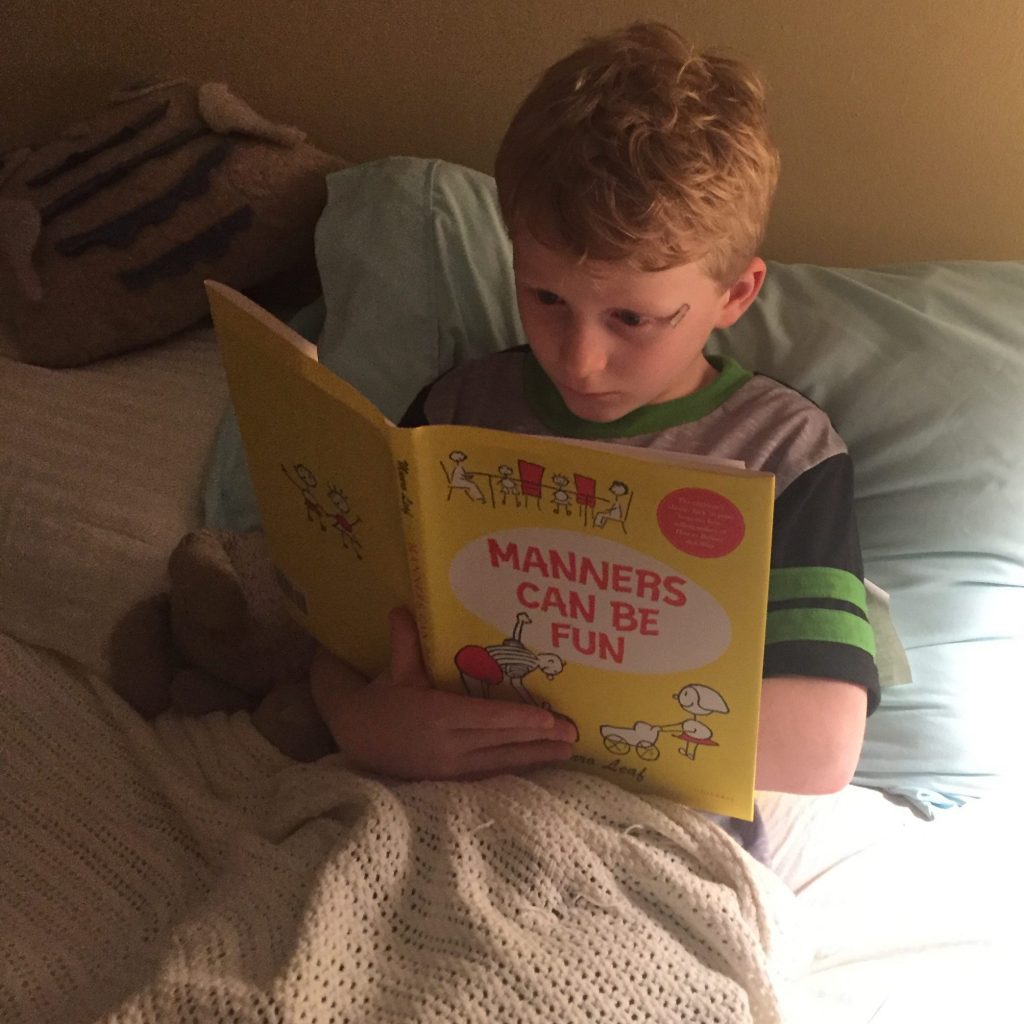
Over the last few months, the most wondrous thing has suddenly picked up steam like a bullet train.
My 7-year-old grandson is READING. Just about everywhere, and everything. Books for his younger sister, longer and more complex stories for himself, the funny papers, restaurant menus, street signs, instructions on the sides of game boxes. He can’t get every word yet, but already he’s getting most, with more all the time. No more questions to me about “what does this say?” He just picks things up and reads them.
As with so many life-changing landmarks with children, there was no fanfare, no siren blaring upon the arrival of this new phase. I remember the day that my daughter (his mom) took her first steps, grasping the edge of the couch cushion at the babysitter’s house. Oddly, there were no pealing of bells, no swelling Broadway chorus of She’s Walking! When Buddy offered to read a page of a book I was reading aloud to his sister, he proceeded to do so without hesitation or error. The only announcement was the surely audible pounding of my proud heart. (And I might have swelled up some, like the stentorious Mr. Toad.)
Rich images of mesmerizing potential came quickly into view. How could I help him to love books, like I do? Maybe like the bookstore as much, or more, than the video store? Will he someday enjoy discussing a favorite author, maybe argue the merits of one legendary fictional character vs. another? (For example, would the immortal “gentleman’s personal gentleman” Jeeves stay with Bertie Wooster if the legendary bachelor ever got hitched? OK, perhaps that one is a bit of a stretch this early, but you get the idea.)
Yet with many of those same childhood miracles, there is a lingering shadow or two to consider. Suddenly, I’m scrambling to adequately offer appropriate reading choices. How to stock the home library when he visits? My current inventory of children’s reading looks more like a bookshelf for Sis, at five: more of the Goodnight Moon, Runaway Bunny, Little Owl, you know the gentle, lull-them-to-sleep variety. Sis still likes these selections and still loves us to read aloud.
For the older brother, current popular choices run toward things about which his G-ma knows a Big Towering Zilch. What, pray enlighten me, is the concept behind Minecraft, books and games featuring a bunch of pixillated images filled with characters made of Legos? And even tougher to grasp, if you lightly examine the visuals, we have “Plants vs. Zombies.” The cartoon books (thank goodness I have not yet been subjected to the actual video game) seem to contain tales of using plants to prevent zombies from eating brains. We can all agree to vote for preserving brains, that’s affirmative, but Is this something that a grandparent wants to stock around the house? Does the joy of discussing books with my grandson stretch to a zombie tale?
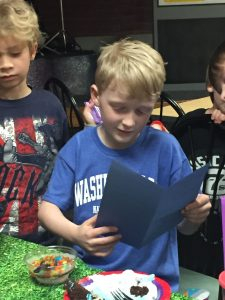
Still contemplating the answer to that one, I already yearn for the days when I didn’t fear the open world of words and its power to deprive Buddy of his innocence. Last week we had a terrible mass shooting here in our city. Should I put away the newspaper when he comes over? A week or so earlier, we pulled up in traffic next to a car with a glittering, metallic sticker on the passenger window nearest us that shouted, “F….k this Shit.” Buddy, in his car seat in the back, could look straight at this window. I eased the car slightly forward and asked him a distracting question, hoping I wouldn’t be the first soul he asked to explain those words. Maybe I’m kidding myself; maybe it’s already happened. I decided I didn’t want to ask. It’s a tough world out there.
At the grassroots level of daily kid management, the wonderful world of reading also threatens one of the most historically effective operational tricks of adult supervision. What he can read, he will very soon also spell, and then life as we know it is a whole new ball game. How are we supposed to talk about the children in front of them, without spelling out the relevant sensitivities?
First signal of this upcoming cataclysm occurred recently when I asked his mother, in front of him, about options for dinner. “What do you think we should give them to E.A.T.?” I asked. Standing nearby, Buddy froze in his tracks, his face a map of intense concentration. I watched him slowly, silently mouth the letters—E. A. T.. In a split second, his expression shifted from effort to triumph. Certain in his comprehension, he turned to me and smiled hopefully as he suggested, “Pizza?”
As the era looms when this useful operational technique fades into obsolescence, what will emerge in its place? What if I need to telegraph some transgression that landed him in time out, without him realizing I sold him out to the authorities? Or—and yes, this can happen when you least expect it—he has eaten something that his system rejected, and I need to tell his mom he had D I A R R H E A? Thank goodness, it appears that spelling trails reading by a somewhat workable margin, so perhaps there is a brief window to plot a future alternative.
Back on the literature selection front, I recently observed Buddy reading a newly reprinted volume I found of the 1936 children’s classic Manners Can Be Fun. This book, with its cartoon characters impersonating various ill-mannered transgressions, still teaches and amuses at the same time, 80 years after original publication. The Snoopers (and their huge noses) walk right into rooms without knocking! “If they…asked if they might come in, people would not call them SNOOPERS.”
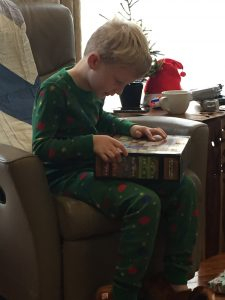
 Buddy pointed to his favorite Manners character, Touchey, who has nine arms and hands, but no head. Touchey never thinks about whether he should touch things or not; “Maybe it’s because he hasn’t any head—he is all hands.” If poor headless Touchey, with his nine hands on stick arms, can still generate a spontaneous cackle, maybe there is still time before the little-boy perspective shifts forever into a different realm. Or maybe even in our overwhelmingly digital universe, some books, some old stories still stand tall in the test of time, with enduring charm for all ages, ad infinitum. Maybe it’s both. I hope so.
Buddy pointed to his favorite Manners character, Touchey, who has nine arms and hands, but no head. Touchey never thinks about whether he should touch things or not; “Maybe it’s because he hasn’t any head—he is all hands.” If poor headless Touchey, with his nine hands on stick arms, can still generate a spontaneous cackle, maybe there is still time before the little-boy perspective shifts forever into a different realm. Or maybe even in our overwhelmingly digital universe, some books, some old stories still stand tall in the test of time, with enduring charm for all ages, ad infinitum. Maybe it’s both. I hope so.
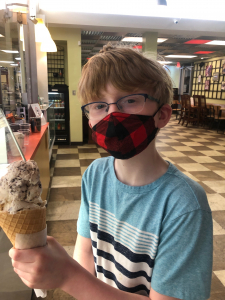 ut comfortably, I encircled his thin shoulders with one arm, then both. Our Buddy is 10 now, tall, angular, thin, elbows and feet everywhere, an openly tender and vulnerable young soul. Inside the safety of my arms, he signed softly for a beat or two, then squeezed back in response.
ut comfortably, I encircled his thin shoulders with one arm, then both. Our Buddy is 10 now, tall, angular, thin, elbows and feet everywhere, an openly tender and vulnerable young soul. Inside the safety of my arms, he signed softly for a beat or two, then squeezed back in response.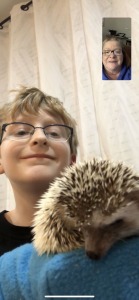

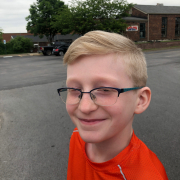
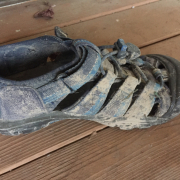
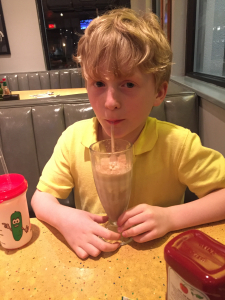
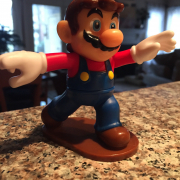
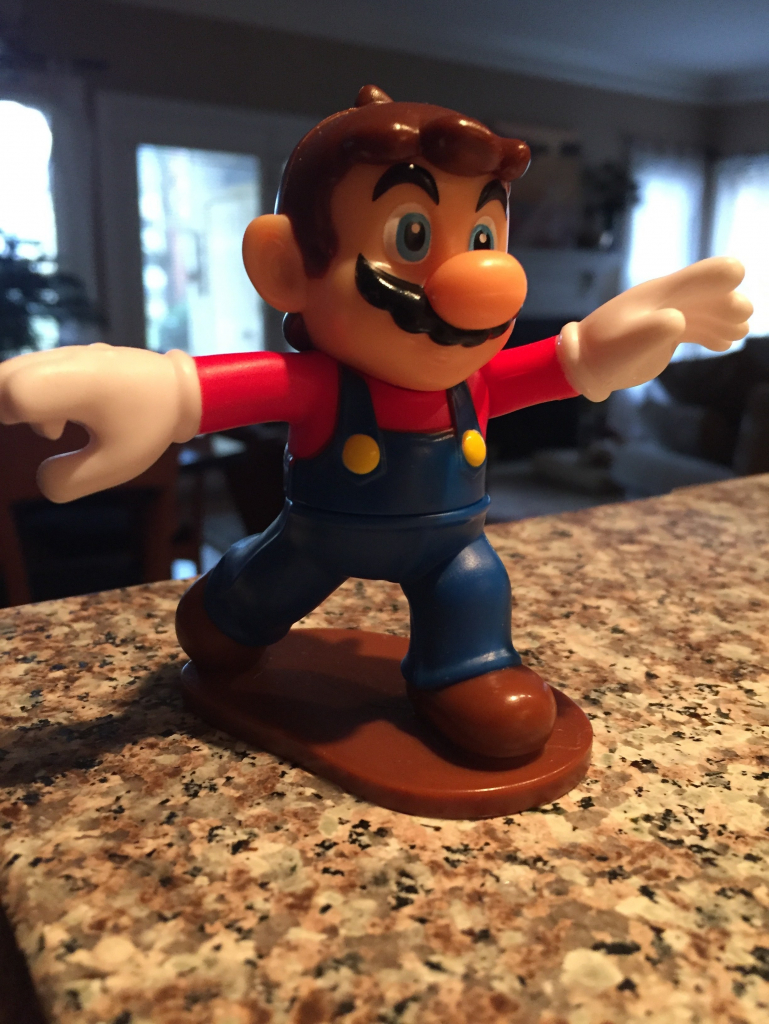




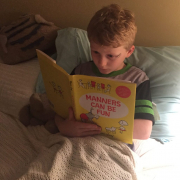



 Buddy pointed to his favorite Manners character, Touchey, who has nine arms and hands, but no head.
Buddy pointed to his favorite Manners character, Touchey, who has nine arms and hands, but no head.